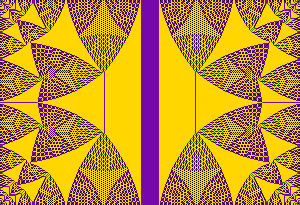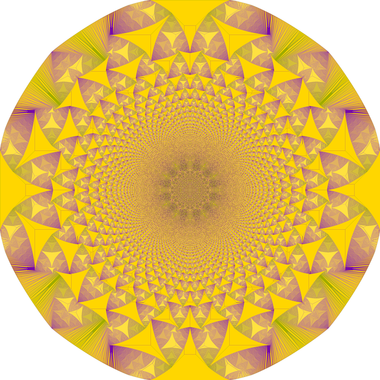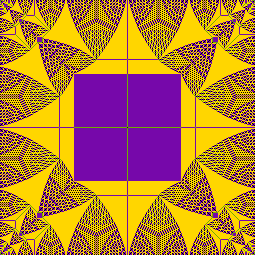“沙堆模型”的版本间的差异
(→扩展沙堆模型) |
|||
| 第213行: | 第213行: | ||
===扩展沙堆模型=== | ===扩展沙堆模型=== | ||
| − | [[File:Harmonic Sandpile Dynamics.gif|thumb| | + | [[File:Harmonic Sandpile Dynamics.gif|thumb|由谐波函数<math>H=x*y</math>在规模为255x255的方格上引起的沙堆动力学。]] |
2021年3月12日 (五) 19:13的版本
阿贝尔沙堆模型 Abelian sandpile model,也被称为 Bak-Tang-Wiesenfeld 模型,是第一个发现的动力系统展现自组织临界性的例子。它是由 Per Bak,Chao Tang 和 Kurt Wiesenfeld 在1987年的一篇论文[1]中提出的。
这个模型是一种 元胞自动机模型 Cellular automaton。在最初的公式中,有限网格上的每个位置都有一个与沙堆的坡度相对应的关联值。当“沙粒”(或“碎片”)被随机放置在沙堆上时,被放置位置的坡度就会不断累加,直到坡度超过一个特定的阈值时,这个位置便发生崩塌,沙子就会转移到其邻近的位置,而增加后者的坡度。Bak, Tang和 Wiesenfeld考虑了在网格上持续随机放置沙粒的过程; 每次这样在某个位置放置沙粒有可能不会产生影响,也有可能会引起级联反应而影响一大片位置。
该模型已经在无限栅格、其他非方形栅格和任意图(包括有向多重图)上进行了研究[2]。它与美元博弈游戏密切相关,这个游戏是Biggs提出的一种开除碎片 chip-firing 游戏的变体。[3]
定义(矩形网格)
沙堆模型起初是一个定义在[math]\displaystyle{ N\times M }[/math]矩形网格(棋盘格)上的元胞自动机cellular automaton 。
对于栅格中的每个顶点[math]\displaystyle{ (x,y)\in\Gamma }[/math],我们关联一个值(沙粒、坡度、颗粒)[math]\displaystyle{ z_0(x,y)\in\{0,1,2,3\} }[/math],这样所有顶点的初始状态[math]\displaystyle{ z_0\in\{0,1,2,3\}^\Gamma }[/math]被称为沙堆的(初始)构型。
自动机的动力学过程在第[math]\displaystyle{ i\in\mathbb{N} }[/math]次迭代时的定义如下:
- 1.按概率分布(通常服从均匀分布)选择一个随机顶点[math]\displaystyle{ (x_i,y_i)\in\Gamma }[/math]。
- 2.向这个顶点添加一粒沙子,同时让其他顶点的沙粒数保持不变,也就是对于所有的[math]\displaystyle{ (x,y)\neq(x_i,y_i) }[/math],设定
[math]\displaystyle{ z_i(x_i,y_i)=z_{i-1}(x_i,y_i)+1 }[/math] 和
[math]\displaystyle{ z_i(x,y)=z_{i-1}(x,y) }[/math]。
- 3.如果所有的顶点都是稳定的,即如果对于[math]\displaystyle{ (x,y)\in\Gamma }[/math],[math]\displaystyle{ z_i(x,y)\lt 4 }[/math],那么构型[math]\displaystyle{ z_i }[/math]被认为是稳定的。在这种情况下,重新开始步骤1进行下一轮迭代。
- 4.如果至少有一个顶点是不稳定的,即对于一些[math]\displaystyle{ (x_u,y_u)\in\Gamma }[/math],[math]\displaystyle{ z_i(x_u,y_u)\geq 4 }[/math],[math]\displaystyle{ z_i }[/math]被认为是不稳定的。在这种情况下,对于每个不稳定差点[math]\displaystyle{ (x_u,y_u)\in\Gamma }[/math]。将该顶点的沙粒数减少4个,并将其每个(最多4个)直接邻居的沙粒数各增加1个。即:
[math]\displaystyle{ z_i(x_u,y_u) \rightarrow z_i(x_u,y_u) - 4, }[/math], 如果 [math]\displaystyle{ ( x_u \pm 1, y_u\pm 1)\in\Gamma }[/math].
,
[math]\displaystyle{ z_i( x_u \pm 1, y_u \pm 1) \rightarrow z_i( x_u \pm 1, y_u\pm 1) + 1 }[/math]。如果一个在栅栏边界的顶点产生崩塌,这将导致沙粒丢失到系统之外(若这个顶点在栅栏的顶角,则损失两颗沙粒;若在栅栏的边上,则损失一颗)。
- 5.由于沙粒的重新分布,一个顶点的崩塌可能会使其他顶点变得不稳定。就重复上述步骤四的崩塌的过程,直到[math]\displaystyle{ z_i }[/math]状态下的所有顶点最终稳定下来,然后执行步骤1继续下一轮迭代。
在一次迭代中多个顶点的崩塌被称为”雪崩“。每一次雪崩最终都会停止,也就是说,经过有限数量的顶点崩塌,会达到某种稳定的构型。这样就定义好了自动机。此外,尽管崩塌序列中各个顶点的崩塌顺序通常有许多可能的选择,但最终的稳定状态并不依赖于这个顺序; 这是沙堆模型具有可交换性的含义。类似的,在每次迭代过程中,每个顶点的崩塌次数也与崩塌顺序的选择是无关的。
定义(无向有限多重图)
为了将沙堆模型从标准方格的矩形网格(棋盘格)推广到任意无向有限多重图 [math]\displaystyle{ G=(V,E) }[/math] ,在 [math]\displaystyle{ V }[/math] 中指定了一个不允许崩塌的特殊顶点——吸收(汇)”sink“ 顶点[math]\displaystyle{ s }[/math]。模型的构型(或状态)函数[math]\displaystyle{ z:V\setminus\{s\}\rightarrow\mathbb{N}_0 }[/math]用来计算每个非吸收顶点上的非负沙粒数。非吸收顶点[math]\displaystyle{ v\in V\setminus\{s\} }[/math]在[math]\displaystyle{ z(v)\geq \deg(v) }[/math]时是不稳定的,它会产生崩塌,向给它的每个非吸收邻居分发一颗沙粒:
- [math]\displaystyle{ z(v) \to z(v) - \deg(v) }[/math]
- [math]\displaystyle{ z(u) \to z(u) + 1 }[/math]对于所有的[math]\displaystyle{ u\sim v }[/math], [math]\displaystyle{ u\neq s }[/math]
像前面一样,这个元胞自动机可以运行起来,即在每次迭代中,向随机选择的非吸收顶点添加一个沙粒,不断进行崩塌过程,直到所有顶点都稳定。
我们前面讨论的在标准方格的有限矩形网格上的沙堆模型可以看做以下定义的一个特例,在图[math]\displaystyle{ G=(V,E) }[/math],添加一个吸收顶点,并将其连接到边界上的顶点,使得[math]\displaystyle{ G }[/math]的每个非吸收顶点的度数为4。以这种方式,也可以定义标准正方形网格(或任何其他类型晶格)的非矩形格上的沙堆模型: 用[math]\displaystyle{ \mathbb{Z}^2 }[/math]横截[math]\displaystyle{ \mathbb{R}^2 }[/math]的一些有界子集[math]\displaystyle{ S }[/math],收缩其两个端点不在[math]\displaystyle{ S\cap\mathbb{Z}^2 }[/math]中的[math]\displaystyle{ \mathbb{Z}^2 }[/math]的每条边。[math]\displaystyle{ S\cap\mathbb{Z}^2 }[/math]之外的单独一个剩余顶点构成了最终沙堆图的吸收顶点。
常返构型和瞬态构型
在上面定义的沙堆自动机的动力学过程中,一些稳定状态的构型(对于所有[math]\displaystyle{ v\in G\setminus\{s\} }[/math],[math]\displaystyle{ 0\leq z(v)\lt 4 }[/math])会无限频繁的出现,而另一些则只能出现有限次(如果真的发生的话)。前者被称为“常返构型”,而后者被称为“瞬态构型”。因此,常返性构型由包含一类稳定的非负构型组成,这些构型可以从任何其他稳定构型中,通过反复向顶点添加沙粒,产生崩塌而得到。很容易看出,“最差稳定构型”(马上就不稳定了)[math]\displaystyle{ z_m }[/math]就是每个顶点都有[math]\displaystyle{ z_m(v)=deg(v)-1 }[/math]颗沙粒的情况,这可从任何其他稳定构型得到(通过向每个顶点添加[math]\displaystyle{ deg(v)-z(v)-1\geq 0 }[/math]颗沙粒)。因此,也就是说,所有常返构型可以从最差稳定构型开始,通过添加沙粒,崩塌再稳定后得到。
并非所有非负稳定构型都是常返的。例如,在一个至少包含由两个连通的非吸收顶点的图结构的沙堆模型中,这两个顶点均没有沙粒的所有构型,是稳定的单不是常返的。为了证明这一点,首先要注意,增加沙粒而不崩塌的话只会让着两个顶点的沙粒的总数变大,若从一个不是这种情况的构型出发,要达到两个顶点都没有沙粒的构型,必然涉及到两个顶点中至少有一个崩塌。而崩塌是有先后的,这两个顶点中的一定有一个是最后崩塌。由于崩塌会对每个相邻的顶点转移一颗沙粒,这意味着两个顶点共同放置的沙粒总数不能低于一颗,因而得证。
沙堆群
给定一个构型[math]\displaystyle{ z }[/math],[math]\displaystyle{ z(v)\in\mathbb{N}_0 }[/math]对于所有[math]\displaystyle{ v\in G\setminus\{s\} }[/math],在有限连通图上使不稳定的非吸收顶点崩塌,直到没有剩下稳定的非汇顶点,这将导致唯一的“稳定”构型[math]\displaystyle{ z^\circ }[/math],这就是[math]\displaystyle{ z }[/math]的“稳定化”。给定两个稳定构型[math]\displaystyle{ z }[/math]和[math]\displaystyle{ w }[/math],我们可以定义运算[math]\displaystyle{ z*w \to (z+w)^\circ }[/math],对应于沙粒在各个顶点加起来后得到的稳定沙堆。corresponding to the vertex-wise addition of grains followed by the stabilization of the resulting sandpile.
给定一个任意但固定的非吸收顶点的顺序,进行多个崩塌操作,可以通过使用拉普拉斯矩阵[math]\displaystyle{ \Delta=D-A }[/math]高效地编码不稳定构型的稳定过程中的多个崩塌操作,其中[math]\displaystyle{ D }[/math]是图的度矩阵,[math]\displaystyle{ A }[/math]是图的邻接矩阵。
删除与吸收顶点相对应的 [math]\displaystyle{ \Delta }[/math]的行和列,得到简化的图拉普拉斯矩阵 [math]\displaystyle{ \Delta' }[/math]。然后,当以一个构型[math]\displaystyle{ z }[/math] 开始,并将各个顶点[math]\displaystyle{ v }[/math]进行总共[math]\displaystyle{ \mathbf{x}(v)\in\mathbb{N}_0 }[/math]次的崩塌操作时,产生[math]\displaystyle{ z-\Delta'\boldsymbol{\cdot}~\mathbf{x} }[/math]构型,其中[math]\displaystyle{ \boldsymbol{\cdot} }[/math]是收缩积。此外,如果 [math]\displaystyle{ \mathbf{x} }[/math] 对应于在给定构型[math]\displaystyle{ z }[/math]的稳定过程中每个顶点产生崩塌的次数,则
- [math]\displaystyle{ z^\circ=z-\Delta'\boldsymbol{\cdot}~\mathbf{x} }[/math]
在这种情况下,[math]\displaystyle{ \mathbf{x} }[/math]被称为[math]\displaystyle{ z }[/math]的稳定过程的崩塌或计程函数 odometer function。
在[math]\displaystyle{ * }[/math]运算下,常返构型的集合构成一个与约化图拉普拉斯矩阵[math]\displaystyle{ \Delta' }[/math]的核同构的阿贝尔群,即[math]\displaystyle{ \mathbf{Z}^{n-1}/\mathbf{Z}^{n-1}\Delta' }[/math],其中[math]\displaystyle{ n }[/math] 表示顶点数(包括吸收顶点)。更一般地说,稳定构型集(瞬态和常返)在[math]\displaystyle{ * }[/math].运算下形成 交换幺半群Commutative monoid。这个幺半群的最小理想同构于常返构型群。The minimal ideal of this monoid is then isomorphic to the group of recurrent configurations.
由常返构型形成的群,以及与之同构的群[math]\displaystyle{ \mathbf{Z}^{n-1}/\mathbf{Z}^{n-1}\Delta' }[/math],通常被称为 沙堆群Sandpile group。同样的群也常被称作为“临界群”、“Jacobian群”或(比较不常见的)“Picard群”。
然而,要注意的是,有些作者只把常返构型形成的组称为沙堆组,而为由[math]\displaystyle{ \mathbf{Z}^{n-1}/\mathbf{Z}^{n-1}\Delta' }[/math](或相关的同构定义)定义的同构群保留Jacobian群或临界群的称呼。最后,一些作者使用Picard群来指代沙堆群和[math]\displaystyle{ \mathbb{Z} }[/math]的直积,后者出现在与沙堆模型密切相关的元胞自动机中,被称为 开除碎片或美元博弈游戏Chip firing or Dollar game。
给定上述同构,沙堆群的阶是[math]\displaystyle{ \Delta' }[/math]的行列式,根据矩阵树定理,它是图的生成树的个数。
自组织临界性
模型最初源于这样一个事实,即在晶格上的模拟中,不需要精细调整任何参数,系统被吸引到了它的临界状态,此时系统的关联长度和关联时间趋于无穷大。这与早期临界现象的例子形成了对比,例如固体和液体之间,或液体和气体之间的相变 phase transition,其中临界点只能通过精确调节参数(例如,温度)来达到。因此,在沙堆模型中,我们可以说临界性是自组织的。
一旦沙堆模型达到其临界状态,系统对扰动的响应和扰动细节之间的关联就没有了。一般来说,这意味着再往沙堆放一粒沙子可能不会导致任何事情发生,也可能导致整个沙堆大滑坡。该模型还显示了1/f噪声 [math]\displaystyle{ 1/f noise }[/math],这是自然界中许多复杂系统的共同特征。
沙堆模型只有在二维或者更高维度才会表现出临界现象。虽然沙堆模型可以放在一维上,但它不会演化到临界状态; 而是倾向于到达最差稳定态,此时每个格点上的沙粒数都马上要达到临界值。
对于二维情况,沙堆模型被假设认为可以对应到中心电荷为c = −2的辛费米子 symplectic fermion构成的共行场理论。[4]
属性/性质
最小作用原理
碎片构型的稳定化遵循一种“最小作用原理”的形式:每个顶点在稳定过程中不超过必要的崩塌量。[5]
这可以如下形式化的描述。如果一个序列只崩塌了不稳定的顶点而达到了稳定构型,则称其为“合法的”,沙堆稳定化的标准方法是找到一个最大的合法崩塌序列,也就是说,让崩塌序列尽可能地长。这种序列具有明显的稳定性,沙堆的可交换性质是所有这些置换后的序列都是等价的,也就是说,对于任何顶点[math]\displaystyle{ v }[/math],在所有合法的稳定序列中[math]\displaystyle{ v }[/math]的崩塌次数都是不变的。根据最小作用原理,最小稳定序列等价于合法的(且稳定的)崩塌序列的置换。特别地,由最小稳定序列产生的构型与由最大合法序列产生的构型是相同的。
More formally, if [math]\displaystyle{ \mathbf{u} }[/math] is a vector such that [math]\displaystyle{ \mathbf{u}(v) }[/math] is the number of times the vertex [math]\displaystyle{ v }[/math] topples during the stabilization (via the toppling of unstable vertices) of a chip configuration [math]\displaystyle{ z }[/math], and [math]\displaystyle{ \mathbf{n} }[/math] is an integral vector (not necessarily non-negative) such that [math]\displaystyle{ z-\mathbf{n}\Delta' }[/math] is stable, then [math]\displaystyle{ \mathbf{u}(v) \leq \mathbf{n}(v) }[/math] for all vertices [math]\displaystyle{ v }[/math].
更形式化地说,如果[math]\displaystyle{ \mathbf{u} }[/math]是一个向量, [math]\displaystyle{ \mathbf{u}(v) }[/math]是碎片构型[math]\displaystyle{ z }[/math]在稳定过程中(通过不稳定顶点的崩塌)顶点[math]\displaystyle{ v }[/math]崩塌的次数,
[math]\displaystyle{ \mathbf{n} }[/math]是一个积分向量(不一定是非负的),使得[math]\displaystyle{ z-\mathbf{n}\Delta' }[/math]是稳定的,那么对于所有顶点[math]\displaystyle{ v }[/math],有[math]\displaystyle{ \mathbf{u}(v) \leq \mathbf{n}(v) }[/math]。
标度极限
动画显示了在不同的[math]\displaystyle{ N\times N,N\geq 1 }[/math]网格上的沙堆群一个实例的常返构型,随着[math]\displaystyle{ N }[/math]增加的情况。将构型标度变换到同样的物理尺寸。看起来,更多的网格会表现得更加精细,并逐步“收敛到一个连续的图像”。从数学上讲,这是因为基于弱收敛的概念(或其他一些广义的收敛概念),方格上的沙堆模型在缩放极限。事实上,Wesley-Pegden和Charles-Smart已经证明了常返沙堆构型存在缩放极限[6] [7]。在与Lionel Levine的进一步合作中,他们使用缩放极限来解释了方格上沙堆的分形结构。[8]
推广与相关模型
无限网格上的沙堆模型
有一些工作将沙堆模型推广到无限网格上。一般来说,这种推广会遇到一个挑战,就是不能保证每次雪崩最终都会停止。因此,一些推广只考虑了能确保会结束的构型稳定化。
在一个(无限)方格上定义的常见的模型,其节点[math]\displaystyle{ (x,y)\in\mathbb{Z}^2 }[/math],具体定义如下:
从一个有限的非负构型[math]\displaystyle{ z(x,y)\in \mathbf{Z} }[/math]开始,即有
- [math]\displaystyle{ \sum_{x,y}z(x,y)\lt \infty. }[/math]
任何位置[math]\displaystyle{ (x,y) }[/math]有
- [math]\displaystyle{ z(x,y)\geq 4 }[/math]
就是“不稳定的”,会产生崩塌,将它位置上的沙粒输送给它的四个邻居:
- [math]\displaystyle{ z(x,y) \rightarrow z(x,y) - 4, }[/math]
- [math]\displaystyle{ z( x \pm 1, y) \rightarrow z( x \pm 1, y) + 1, }[/math]
- [math]\displaystyle{ z(x, y \pm 1) \rightarrow z( x, y \pm 1 ) + 1. }[/math]
由于初始构型是有限的,这一过程必然会随着沙粒向外散布终止。
一个常见的例子是,初始时候只在原点放置大量沙粒,逐步崩塌后会形成分形图案(见图)。当初始沙粒数趋于无穷时,标度变换的稳定构型会收敛到唯一极限。[7][8]
有向图上的沙堆模型
沙堆模型可以推广到任意有向多重图。规则是任何顶点[math]\displaystyle{ v }[/math]有
- [math]\displaystyle{ z(v)\geq \deg^{+}(v) }[/math]
则是不稳定的;崩塌将它的碎片沿着边的输出方向,分发给它的邻居:
- [math]\displaystyle{ z(v) \rightarrow z(v) - \deg^{+}(v) + \deg(v,v) }[/math]
并且,对于每个[math]\displaystyle{ u\neq v }[/math]:
- [math]\displaystyle{ z(u) \rightarrow z(u) + \deg(v,u) }[/math]
其中,[math]\displaystyle{ \deg(v,u) }[/math]是从[math]\displaystyle{ v }[/math]到[math]\displaystyle{ u }[/math]的边数。
在这种情况下,拉普拉斯矩阵是不对称的。如果我们设定一个吸收顶点[math]\displaystyle{ s }[/math],使得每一个顶点都有一条到[math]\displaystyle{ s }[/math]的路径,那么在有限图上的稳定化操作是可以定义好的,并且沙堆群可以写出来,你会发现和之前是一样的:[math]\displaystyle{ \mathbf{Z}^{n-1}/\mathbf{Z}^{n-1}\Delta' }[/math]
沙堆群的阶还是[math]\displaystyle{ \Delta' }[/math]的行列式,根据矩阵树定理的一般版本,它是以吸收顶点为根的有向生成树的个数。
扩展沙堆模型
为了更好地理解不同有限凸网格[math]\displaystyle{ \Gamma\subset\mathbb{Z}^2 }[/math]的沙堆群的结构,Lang和Shkolnikov在2019年提出了“扩展沙堆模型”。[9]扩展沙堆模型的定义与“通常的沙堆模型”几乎完全相同(即原始的Bak–Tang–Wiesenfeld模型[1]),除了网格边界[math]\displaystyle{ \partial\Gamma }[/math]的顶点现在允许放置非负实数的沙粒。相比之下,网格内部的顶点仍然只允许放置整数个粒子。崩塌规则保持不变,即假设当沙粒数达到或超过4时,内部顶点和边界顶点都变得不稳定并发生崩塌。
Also the recurrent configurations of the extended sandpile model form an abelian group, referred to as the extended sandpile group, of which the usual sandpile group is a discrete subgroup. Different to the usual sandpile group, the extended sandpile group is however a continuous Lie group. Since it is generated by only adding grains of sand to the boundary [math]\displaystyle{ \partial\Gamma }[/math] of the grid, the extended sandpile group furthermore has the topology of a torus of dimension [math]\displaystyle{ |\partial\Gamma| }[/math] and a volume given by the order of the usual sandpile group.[9]
此外,扩展沙堆模型的循环配置形成了一个阿贝尔群,称为“扩展沙堆群”,其中通常的沙堆群是离散子群。与通常的沙堆群不同,扩展沙堆群是一个连续的李群。由于它仅通过将沙粒添加到网格的边界[math]\displaystyle{ \partial\Gamma }[/math]而生成,因此扩展的沙堆组还具有维度[math]\displaystyle{ \partial\Gamma }[/math]的拓扑的环和由通常沙堆组的顺序给出的体积[9]
==Zcy(讨论)Since it is generated by only adding grains of sand to the boundary [math]\displaystyle{ \partial\Gamma }[/math] of the grid翻译存疑。a volume given by the order of the usual sandpile group.翻译存疑。==Zcy(讨论)
Of specific interest is the question how the recurrent configurations dynamically change along the continuous geodesics of this torus passing through the identity. This question leads to the definition of the sandpile dynamics
特别令人感兴趣的问题是,在这个圆环体通过恒等的连续测地线s上,循环构型是如何动态变化的。这个问题引出了沙堆动力学的定义
==Zcy(讨论)identity在整篇文章中的翻译需进行统一,如何翻译??同一性,恒等式??==Zcy(讨论)
- [math]\displaystyle{ D_H(t)=(I-t\Delta H)^\circ }[/math] (扩展沙堆模型)
respectively
- [math]\displaystyle{ \tilde{D}_H(t)=(I+\lfloor-t\Delta H\rfloor)^\circ }[/math] (普通沙堆模型)
This proposes a natural renormalization for the extended and usual sandpile groups, meaning a mapping of recurrent configurations on a given grid to recurrent configurations on a sub-grid. Informaly, this renormalization simply maps configurations appearing at a given time [math]\displaystyle{ t }[/math] in the sandpile dynamics induced by some harmonic function [math]\displaystyle{ H }[/math] on the larger grid to the corresponding configurations which appear at the same time in the sandpile dynamics induced by the restriction of [math]\displaystyle{ H }[/math] to the respective sub-grid.[9]
这为扩展的和常见的沙堆群提出了一个自然的重整化,这意味着给定网格上的循环配置映射到子网格上的循环配置。非正式地,这种重正化简单地映射了沙堆动力学中给定时间[math]\displaystyle{ t }[/math]时的组态,将由较大网格上的一些调和函数[math]\displaystyle{ H }[/math]导出的相应组态映射到同时出现在沙堆动力学中,由[math]\displaystyle{ H }[/math]对相应子网格的限制引起的相应组态。[9]
由整值调和函数[math]\displaystyle{ H }[/math]在时间[math]\displaystyle{ t\in\mathbb{R}\setminus\mathbb{Z} }[/math],沙堆群的同一性[math]\displaystyle{ I }[/math]和底函数[math]\displaystyle{ \lfloor.\rfloor }[/math]导出的。[9]对于低阶多项式调和函数,沙堆动力学的特征是组成沙堆恒等式的斑块的光滑变换和明显守恒。例如,由[math]\displaystyle{ H=xy }[/math] 诱导的谐波动力学类似于动画中可视化的主对角线上恒等式的“平滑拉伸”。进一步推测了由相同的谐函数在不同尺寸的正方形网格上引起的动力学构型的弱收敛,这意味着可能存在缩放极限。[9]这为扩展的和普通的沙堆组提出了一个自然的重归一化,这意味着在给定网格上的重复构型映射到子网格上的重复构型。非正式地,重归一化简单地映射了沙堆动力学中给定时间[math]\displaystyle{ t }[/math]时的构型,动力学由大型网格上的谐波函数[math]\displaystyle{ H }[/math]导出到相应的构型,这种构型在[math]\displaystyle{ H }[/math]限制到各自子网格的沙堆动力学中时同时出现。[9]
==Zcy(讨论)上面的整个长句翻译需要重新审校Informaly, this renormalization simply maps==Zcy(讨论)
可分割的沙堆
Levine和Peres在2008年提出了一个与之密切相关的模型,即所谓的“可分割的沙堆模型”。[10]与每个位置[math]\displaystyle{ x }[/math]上的沙粒数量为离散数不同,有一个实数[math]\displaystyle{ s(x) }[/math]代表位置的总质量。如果这个质量是负的,我们就可以把它理解为一个空洞。当一个位置上的质量大于1时,就会发生崩塌; 它将多余的部分均匀地分发给它的邻居,这就导致了如果一个位置在[math]\displaystyle{ t }[/math]的时刻质量是1,它在以后的所有时间质量都是1。
参考文献
- ↑ 1.0 1.1 Bak, P.; Tang, C.; Wiesenfeld, K. (1987). "Self-organized criticality: an explanation of 1/ƒ noise". Physical Review Letters. 59 (4): 381–384. Bibcode:1987PhRvL..59..381B. doi:10.1103/PhysRevLett.59.381. PMID 10035754.
- ↑ Holroyd, A.; Levine, L.; Mészáros, K.; Peres, Y.; Propp, J.; Wilson, B. (2008). Chip-Firing and Rotor-Routing on Directed Graphs. 60. pp. 331–364. arXiv:0801.3306. Bibcode 1987PhRvL..59..381B. doi:10.1007/978-3-7643-8786-0_17. ISBN 978-3-7643-8785-3.
- ↑ Biggs, Norman L. (25 June 1997). "Chip-Firing and the Critical Group of a Graph" (PDF). Journal of Algebraic Combinatorics: 25–45. Retrieved 10 May 2014.
- ↑ S. Moghimi-Araghi; M. A. Rajabpour; S. Rouhani (2004). "Abelian Sandpile Model: a Conformal Field Theory Point of View". Nuclear Physics B. 718 (3): 362–370. arXiv:cond-mat/0410434. Bibcode:2005NuPhB.718..362M. doi:10.1016/j.nuclphysb.2005.04.002. S2CID 16233977.
- ↑ Fey, A.; Levine, L.; Peres, Y. (2010). "Growth Rates and Explosions in Sandpiles". Journal of Statistical Physics. 138 (1–3): 143–159. arXiv:0901.3805. Bibcode:2010JSP...138..143F. doi:10.1007/s10955-009-9899-6. ISSN 0022-4715. S2CID 7180488.
- ↑ Pegden, Wesley; Smart, Charles (2017). "Stability of patterns in the Abelian sandpile". arXiv:1708.09432 [math.AP].
- ↑ 7.0 7.1 Pegden, Wesley; Smart, Charles (2013). "Convergence of the Abelian sandpile". Duke Mathematical Journal. 162 (4): 627–642. arXiv:1105.0111. doi:10.1215/00127094-2079677. S2CID 13027232.
- ↑ 8.0 8.1 Levine, Lionel; Pegden, Wesley (2016). "Apollonian structure in the Abelian sandpile". Geometric and Functional Analysis. 26 (1): 306–336. doi:10.1007/s00039-016-0358-7. hdl:1721.1/106972. S2CID 119626417.
- ↑ 9.0 9.1 9.2 9.3 9.4 9.5 9.6 9.7 Lang, Moritz; Shkolnikov, Mikhail (2019-02-19). "Harmonic dynamics of the abelian sandpile". Proceedings of the National Academy of Sciences (in English). 116 (8): 2821–2830. doi:10.1073/pnas.1812015116. ISSN 0027-8424. PMC 6386721. PMID 30728300.
- ↑ Levine, Lionel; Peres, Yuval (2008-10-29). "Strong Spherical Asymptotics for Rotor-Router Aggregation and the Divisible Sandpile". Potential Analysis (in English). 30 (1): 1–27. arXiv:0704.0688. doi:10.1007/s11118-008-9104-6. ISSN 0926-2601. S2CID 2227479.
进一步阅读
- Per Bak (1996). How Nature Works: The Science of Self-Organized Criticality. New York: Copernicus. ISBN 978-0-387-94791-4.
- Per Bak; Chao Tang; Kurt Wiesenfeld (1987). "Self-organized criticality: an explanation of 1/ƒ noise". Physical Review Letters. 59 (4): 381–384. Bibcode:1987PhRvL..59..381B. doi:10.1103/PhysRevLett.59.381. PMID 10035754.
- Per Bak; Chao Tang; Kurt Wiesenfeld (1988). "Self-organized criticality". Physical Review A. 38 (1): 364–374. Bibcode:1988PhRvA..38..364B. doi:10.1103/PhysRevA.38.364. PMID 9900174.
- Cori, Robert; Rossin, Dominique; Salvy, Bruno (2002). "Polynomial ideals for sandpiles and their Gröbner bases" (PDF). Theor. Comput. Sci. 276 (1–2): 1–15. doi:10.1016/S0304-3975(00)00397-2. Zbl 1002.68105.
- Klivans, Caroline (2018). The Mathematics of Chip-Firing. CRC Press.
- Amini, Omid; Baker, Matthew; Faber, Xander, eds. (2013). "Algebraic geometry of sandpiles". Tropical and non-Archimedean geometry. Bellairs workshop in number theory, tropical and non-Archimedean geometry, Bellairs Research Institute, Holetown, Barbados, USA, May 6–13, 2011. Contemporary Mathematics. 605. Providence, RI: American Mathematical Society. pp. 211–256. doi:10.1090/conm/605/12117. ISBN 978-1-4704-1021-6. Zbl 1281.14002.
拓展链接
- Garcia-Puente, Luis David. "Sandpiles" (YouTube video). YouTube. Brady Haran. Retrieved 15 January 2017.
编者推荐
复杂性与临界现象
本课程中,北京师范大学系统科学院长陈晓松介绍了复杂系统中的平衡态临界现象以及非平衡与复杂系统临界现象。
NetLogo NetLogo多主体建模课程
北京师范大学系统科学学院张江教授通过数个案例教会大家如何去动手搭建一个多主体仿真模型,以及如何利用NetLogo去实现。可以教你如何用Netlogo程序来做人工社会的仿真和模拟。
- 包括以下模型:
- 用“生命游戏”认识Patch
- 从Langton的蚂蚁看Turtle与Patch的交互
- 从羊-草生态系统深入Turtle与Plot画图
- 玩具经济模型与 Turtles间的互动
- 从玩具经济模型学文件导出与复杂曲线绘制
- 从玩具经济模型学习如何使用行为空间做实验
- 透过人工鸟群Boid模型学习List的使用
- 网络上病毒传播的SIR模型 用Links建模网络动力学
- 重访羊-草模型与系统动力学建模
本中文词条由水流心不竞翻译,由Zcy审校,思无涯咿呀咿呀编辑欢迎在讨论页面留言。
本词条内容翻译自 wikipedia.org,遵守 CC3.0协议。




